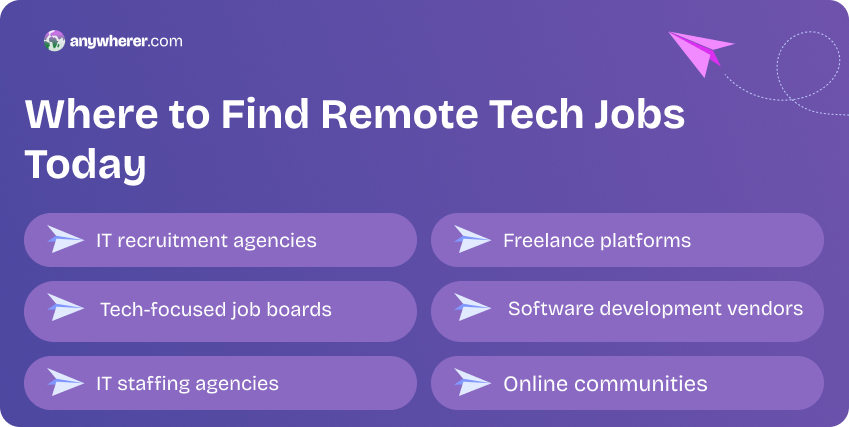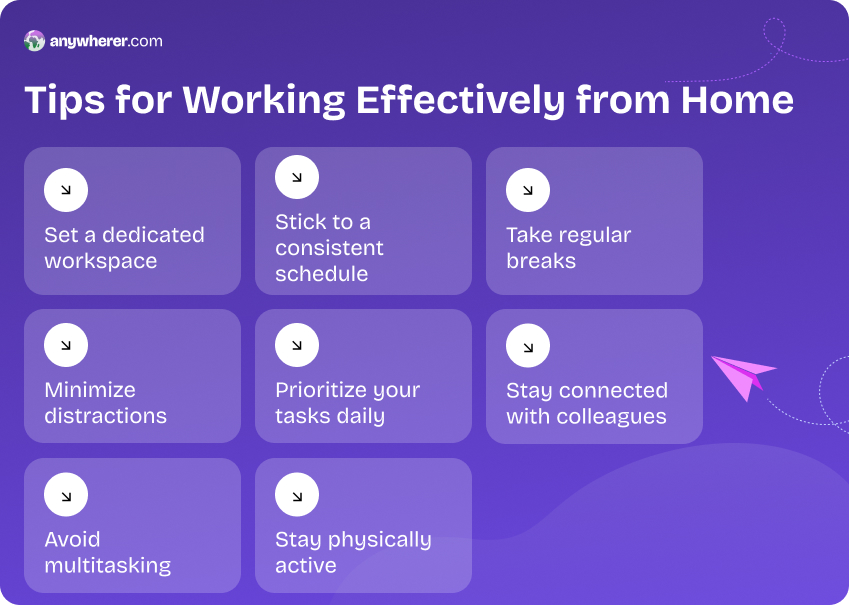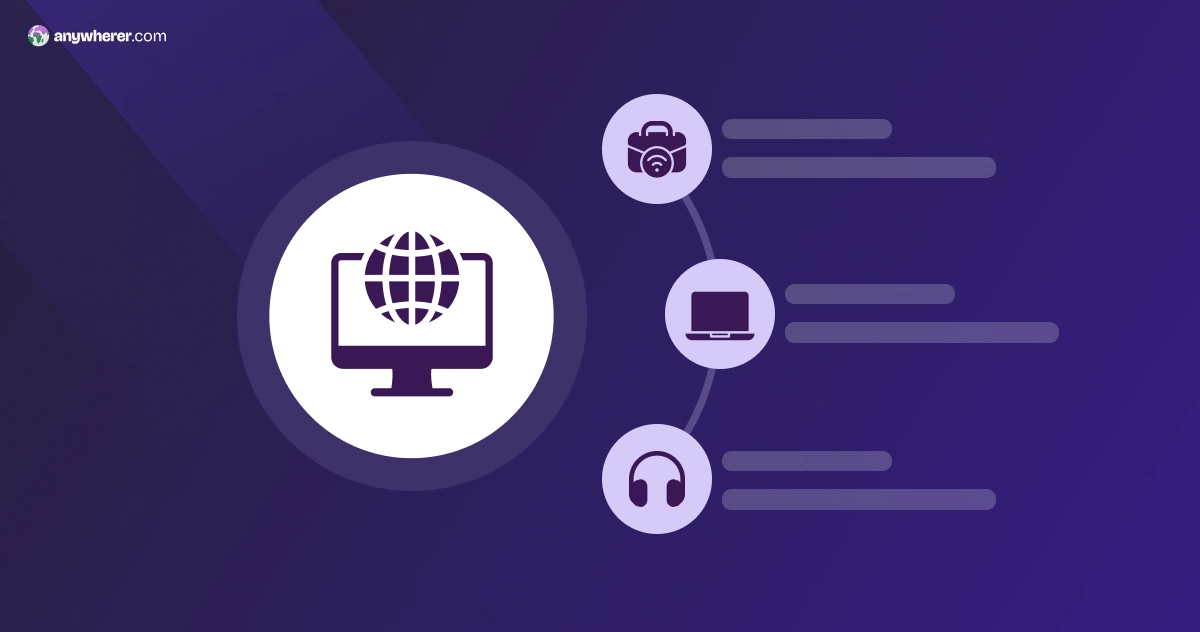Reasons the Remote Work Trend Is Accelerating
Prior to the 2020 pandemic, remote work was on the rise, with 17% of employees working from home five or more days per week. As of 2024, this trend has accelerated, with approximately 32% of employees working remotely. Several factors contribute to this increase:
- Cost reduction. Hiring remote workers remains a cost-effective strategy. Companies save an average of $11,000 annually per remote employee due to reduced overhead expenses like office space, utilities, and supplies.
- Enhanced flexibility. Remote work offers greater flexibility for both organizations and employees. 77% of remote workers report better work-life balance, allowing them to be more productive while managing personal responsibilities.
- Increased productivity. Research indicates that remote work boosts efficiency. A Stanford University study found that remote employees are 13% more productive, while another report suggests they work 1.4 more days per month than their in-office counterparts.
- Technological advancements. Improvements in technology, such as faster internet, cloud computing, and collaboration tools, have made remote work more feasible and efficient.
- Diverse talent pools. Remote work enables companies to hire globally, tapping into talent from regions they previously couldn’t access. 58% of businesses reported improved team diversity as a result of remote hiring.
- Environmental benefits. Remote work reduces commuting, leading to a significant decrease in carbon emissions. If everyone worked remotely half the time, greenhouse gas emissions could be reduced by 54 million tons annually.
- Health and wellness. With the ability to work from home, 78% of remote workers report lower stress levels, and many say they can better focus on health and wellness goals.
These factors suggest that remote work is not only a current trend but is likely to continue growing in the future.
Big Tech Companies Going Fully Remote
There are many tech companies that have already gone remote while plenty of others are in the process or have plans to shift to a remote working model in the future. Here are some totally remote tech companies and some that plan to go remote moving forward.
Automattic
Automattic is the company responsible for Tumblr and WordPress. They are one of the best known distributed workforce companies with almost 1800 employees spread across 77 countries. The remote work culture at Automattic was the subject of a book, “The Year Without Pants: WordPress.com and the Future of Work” in 2013.
Gitlab
Gitlab is a multi-billion dollar company that created a code collaboration platform with over 30 million registered users. They have over 1500 remote employees in over 60 countries. The company has used a remote model for workers since they were first launched in 2014.
VMware
VMware was founded in 1998 and is based in Palo Alto, California. They specialize in cloud and virtualization software and services. VMware is a subsidiary of Dell Technologies with approximately 34,000 employees and has plans to offer permanent remote work to all employees
SAP
SAP is a German software corporation that develops enterprise software for business operations and customer relations. They have over 100,000 employees and are adopting a 100% flexible, trust-based work model. As the world’s third-largest publicly-traded software company by revenue and the largest German company by market capitalization they are among the biggest of the remote first software companies.
Atlassian
Atlassian is an Australian software company founded in 2002 with over 5,700 employees. They specialize in developing products for software developers and development teams. Employees for Atlassian can work from home permanently.
Choosing a Tech Company to Work for on a Remote Basis: Effective Strategies
There are a growing number of remote work tech companies where software developers and other IT specialists can get jobs. However just because a position with a company is remote doesn’t mean it will be right for you. Here are some strategies for choosing remote friendly tech companies to work for.
- Is the company partially or fully remote: although it may not appear to matter if a company is partially or fully distributed as long as your position is remote it can make a difference. Partially distributed tech companies that allow remote work may have a great onboarding process for in-house employees but sometimes overlook their remote staff. Check that the company is committed to remote work and what processes they have in place.
- Fully remote position or hybrid: some work from home software companies will advertise positions as remote but on closer examination they are hybrid. This means that at some point during the work week, you are going to have to make an appearance in the office. For some, this is okay while others prefer 100% remote.
- Location: there are tech companies that allow remote work but still require employees to be in a certain area, be it a city, state or country. It may be for legal reasons, for tax purposes or because of something else. You will need to find out if the company you are considering working for remotely has any geographic restrictions.
- Working hours: working hours can vary depending on the company. Some expect remote employees to keep more or less traditional work hours while others are very flexible as long as the work gets done.
Where to Find Remote Tech Jobs Today: Top 7 Popular Sources
Tech workers have a variety of sources to search for remote jobs. Here are 7 popular sources for finding remote tech jobs:

- IT recruitment agencies: for IT recruitment Europe and North America have both international and regional agencies. IT recruitment agencies can assist specialists with finding remote positions. Recruitment agencies focus on acquiring talent for full-time positions.
- Tech-focused job boards: there are some good tech job boards where developers and engineers can look for remote work. StackOverflow Jobs and AngelList are just 2 of the many tech-focused job boards you can check.
- IT staffing agencies: a remote IT staffing agency is similar to a recruiting agency except they are more focused on finding tech specialists to fill temporary positions. Jobs that an IT staffing agency for remote workers provides may offer contracts of 6-12 months or for the duration of a specific project. They help provide virtual staffing solutions for companies that aren’t looking for full-time employees. Through a remote staffing agency software engineer remote job seekers can find employment with companies all over the world.
- Software development agencies: software development service providers are agencies that contract to companies to help with custom software projects or delivery of technical expertise in through team extension/argumentation, dedicated teams, or project teams. Software development partners often have a large number of teams to service multiple clients and may hire developers full-time, part-time developers or by the project.
- Freelance platforms: you can find plenty of remote tech work on freelancing platforms such as Upwork, Freelancer and Toptal. Depending on the platform it can sometimes be competitive and the pay may be lower than most of your other options.
- Software development vendors: a software development vendor is a company that develops its own product and markets it to other businesses. They often hire remote specialists to provide services to their clients.
- Online communities: if you specialize in a particular technology or framework there is a good chance there is an online community for it. You can find out about remote openings from member and some communities even have their job boards. Reactiflux is an example of an online community for those working with the React framework and there are communities for Vue, Django, and many others.
Regardless of where you find remote tech jobs, make sure you know how to prepare for a virtual interview so that you make a good impression.
How to Work Effectively from Home
After you have landed that remote job, it’s time to get to work. Here is how to work effectively from home.

- Set up a workspace: you don’t need to designate a whole room as your office but you will work more effectively if you have a regular space you work from be it a table or desk. Make sure you have a comfortable chair and everything you need in your area. Try to find a space with as few distractions as possible to work in.
- Have the right tools: the tools will vary depending on the company but you will need a good internet connection, video conferencing software as well as job management and collaboration tools.
- Stick to a regular schedule: while remote work has the advantage of flexibility most people are more effective if they stick to a regular schedule. This doesn’t mean you have to work traditional office hours; just try and work to the same schedule every day.
- Take regular breaks: people tend to be more effective if they take regular breaks throughout the day. Put in 45 to 50 minutes of good work and take a 15-minute break.
Working remotely has plenty of advantages but it can also lead to feeling lonely and isolated. Here are a few tips to help you keep a positive attitude.
- Interact with people: communicate with other employees throughout the day and make it a point to get out and talk to people from time to time.
- Have a regular finish time: when working from home it’s easy to get caught up in what you are doing. Establish a regular stopping time for your work day.
- Work outside occasionally: make it a point to work outside the house once a week. Working in a café, library or co-working space with other people around will make you feel less isolated even if you don’t directly communicate with them.
Frequently Asked Questions About Finding Remote Tech Jobs
What skills are most in demand for remote tech jobs?
Remote tech companies often look for skills like software development, cloud computing, cybersecurity, data analysis, and project management. Soft skills such as communication, time management, and self-discipline are equally important.
Where can I find reliable remote tech job listings?
Some popular platforms for remote tech jobs include LinkedIn, We Work Remotely, Remote.co, AngelList, and FlexJobs. Company career pages and niche tech communities like GitHub or Stack Overflow also frequently list opportunities.
How do I determine if a remote tech company is a good fit?
Research the company’s culture, values, and employee reviews on sites like Glassdoor or Comparably. Look for clear communication, flexible work policies, and tools that support remote work, such as Slack or Asana.
Are remote tech jobs full-time or freelance?
Remote tech jobs can be both. Many companies offer full-time roles with benefits, while others may look for freelance or contract-based arrangements. Be clear on your preferences when applying.
How can I stand out when applying for remote tech jobs?
Tailor your resume and cover letter to highlight remote work experience, tech skills, and your ability to work independently. Having a strong online portfolio or GitHub repository can also set you apart.
What are the challenges of working remotely in a tech role?
Common challenges include managing time zones, maintaining work-life balance, and staying productive without direct supervision. Adopting communication tools and setting a structured work schedule can help overcome these issues.
What should I look for in a remote tech job description?
Pay attention to whether the job lists specific remote requirements like time zone overlap, communication tools (for example, Slack, Zoom), or async work policies. Also check for tech stack details, team structure, and whether the role is part of a distributed team or just temporarily remote.
Do your research and choose the best agency among remote tech companies to get started with your new development team!
Marharyta is a seasoned marketing expert with a rich background in supporting dedicated development teams and a keen understanding of the nuances of global remote employment solutions. With a solid track record of executing impactful campaigns, crafting strategic marketing plans, and delivering high-quality content, Marharyta plays a key role in establishing Anywherer as a reliable source in the EOR and international workforce management industry.




